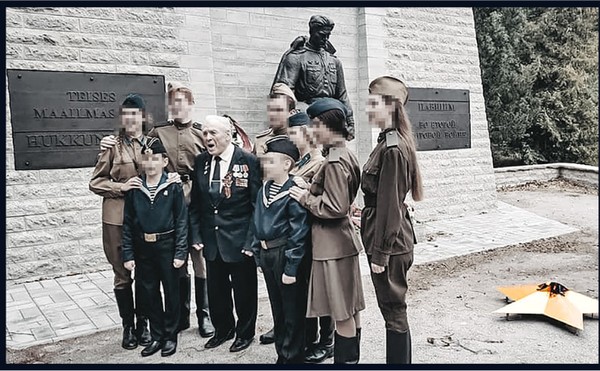
Both the Russian Embassy and local divisive-policy activists will continue to involve young people in events related to the Kremlin’s memory policy, thereby affecting their chances of success in Estonia in the future
Arnold Sinisalu, Director General of the Security Police Board, and Harrys Puusepp, Head of the Office, participated in the press conference.
Some highlights below.
Local followers of Kremlin policies saw the difficult situation caused by the pandemic as an opportunity to spread their messages as they intensified their influence activities on social media. "Following the example of the Russian ruling elite, they first tried to turn the issue of the virus into a matter of belief. However, the spring showed that in a crisis our Russian-speaking population turns to information channels whose reliability they can be sure of. The audience for Estonian official information channels and the Russian-language channels of Estonian Public Broadcasting grew by leaps and bounds", wrote Kapo.
When coronavirus-related activities did not succeed, the Kremlin instead focused on traditional subjects. Criticisms were made of NATO (national defense spending vs. health care spending) and the lack of rights of the Russian-speaking population over restrictions on movement, particularly around the events of May 9th.
During the crisis, both local Russian activists and the Embassy of the Russian Federation wanted to use the coronavirus repeatedly in the interests of the Kremlin's influence. Among the former were individuals who, in order to raise their status in the community, were looking for ways to vaccinate members of the Estonian Russian-speaking community in Russia. How-ever, interest in getting a vaccine injection across the border remained modest.
Advertisement / Reklaam
Advertisement / Reklaam
Russian intelligence gathering remains aggressive2020 was a difficult year for intelligence services operating against Estonia, as restrictions on the cross-border movement of people forced them to change their usual work culture and established methods.
Although the activities of Russian intelligence were significantly hindered due to the spread of the virus during the year, intelligence activities as a whole, including against Estonia, did not stop.
At the beginning of 2020, the usual activity was still underway and several Estonians were approached, either on Russian territory or at the border, in an attempt to recruit them for cooperation. For the most part, the FSB was behind the approaches in Russia. They were forced to adjust their methods after the closure of the borders in March. Face-to-face communication was replaced by email or so-cial media, for example.
"While in previous years we have identified Russian intelligence officers operating in Estonia aggressively approaching Estonians or citizens of other countries living here, there was also less activity in this field because of the coronavirus crisis. " the annual review said.
At the same time, the virus did not affect cyber intelligence so much and the attacks against Estonian and Estonian targets did not stop.
Russia's participation in the Toompea protests
Kapo's director general Arnold Sinisalu said at the press conference that there are no Kremlin-related people among the current organizers of the protests, which mainly took place in Toompea.
"It is not worth seeing Russia's hand there. There are a lot of different people there, for very different reasons. People are protesting, this is their constitutional right," Sinisalu said at a press conference introducing the yearbook.
"So far, the police have calmly and politely controlled this situation, and I do not see any particular problem or concern there," Sinisalu said.
Advertisement / Reklaam
Advertisement / Reklaam
Sinisalu noted that some persons related to Russia have been identified during the protests, but they cannot be considered the organizers of the protests. "Their importance is not so great as to think that they are the organizers of these events," said Sinisalu.China's interest in Estonia is growing
According to the Kapo, intelligence is part of China's quest to become a world leader, including an economic and technological leader, and as an example of high ambitions, China has set a goal of achieving independence from Western technology by 2025 in its current five-year plan.
"Step by step, Beijing is seeking to assert itself in Europe in the fields of politics, the economy and technology procurement. This must also be taken into account by Estonia, both in its cooperation with the People’s Republic of China and in attracting Chinese capital investment" said Kapo.
As an example, Kapo highlighted the case of Tarmo Kõuts, a long-term employee of an Estonian university. Tarmo Kõuts had established a relationship with the Intelligence Bureau of the Joint Staff Department of the Central Military Commission of the People’s Republic of China. Although Chinese military intelligence officers originally appeared to be employees of a Chinese think-tank, their true face and involvement in intelligence became apparent quite quickly. Kõuts met Chinese military intelligence representatives in various Asian countries. The researcher’s professional work was related to the defence field, which is why he had also been granted access to state secrets. He was ready to talk to Chinese military intelligence about his research, but when detained he had not been able to disclose any state secrets. In return for useful information, the researcher received cash and paid foreign trips to Asia, accommodation in expensive hotels and banquets in Michelin-starred restaurants, among other things.
Advertisement / Reklaam
Advertisement / Reklaam
https://www.kapo.ee/sites/defa...
Eesti keeles:
https://kapo.ee/sites/default/...

